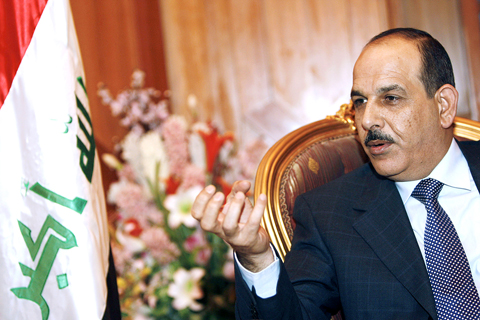Iraqi Defense Minister Abdel Qader Obeidi on Saturday asked parliament for funds to recruit informers, saying that the authorities lacked sufficient information on insurgents.
“Our intelligence services desperately lack information since their budget is so small, and the law states that in order to pay an informer they first have to give his full name and his sources,” Obeidi told members of parliament (MPs).
The minister was testifying to parliament after coordinated explosions in the capital on Tuesday killed 127 people, in the wake of bloody bombings which also struck the city on Aug. 19 and Oct. 25, costing around 250 lives.

PHOTO: AFP
“When someone comes to tell me about a bomb factory or booby-trapped cars I can’t pay him,” Obeidi said in excerpts of his testimony broadcast later on Iraqi television.
“Parliament must allocate the prime minister and security forces a budget allowing them to pay between 5 million and 50 million dinars [US$4,200 to US$42,000] to those who report information on terrorist activities, and especially to be able to protect informers and their sources,” he said.
Obeidi, Iraqi Interior Minister Jawad al-Bolani, National Security Minister Shirwan al-Waili and Baghdad’s former military chief, Lieutenant General Abboud Qanbar, all briefed MPs on Saturday.
The defense minister also proposed grouping all retailers of car parts and electrical items inside one industrial zone monitored by the security services.
“Today there is no control over this type of operation and we know that for Tuesday’s attacks the explosives and vehicles were prepared near the sites where the bombs went off,” Obeidi said.
He also said there was a problem with making arrests in troubled areas because of “a network of terrorists whose task is to free their friends from jail using either corruption or threats.”
“They intervene to remove evidence, and when we arrest a suspect in the act of placing explosives, the network arranges for him to be charged only with possessing weapons, a crime carrying a penalty of just three months in prison,” he said.
Obeidi proposed establishing in areas considered to be high risk special anti-terrorist courts presided over by judges from different regions who would be given the best possible protection.
He also told MPs that the military had recently located 440 bombs and anti-tank charges of Russian manufacture and that they originated in Syria.
“We must put an end to this kind of problem by signing security accords with our neighbors,” he said.
Obeidi, Bolani, Waili and Qanbar — who was sacked as Baghdad security chief by Iraqi Prime Minister Nouri al-Maliki after Tuesday’s attacks that were claimed by an al-Qaeda-linked group — were to continue giving testimony to MPs yesterday.
In a question-and-answer session with MPs on Thursday, Maliki accused rivals of stoking political rows which had put the country’s security at risk, and said Iraq’s security forces needed to be de-politicized.
Earlier on Saturday, an MP quoted Obeidi as saying officials received “clear intelligence” before each of the three massive attacks to hit Baghdad since August but failed to act on it.

Drug lord Jose Adolfo Macias Villamar, alias “Fito,” was Ecuador’s most-wanted fugitive before his arrest on Wednesday, more than a year after he escaped prison from where he commanded the country’s leading criminal gang. The former taxi driver turned crime boss became the prime target of law enforcement early last year after escaping from a prison in the southwestern port of Guayaquil. Ecuadoran President Daniel Noboa’s government released “wanted” posters with images of his face and offered US$1 million for information leading to his capture. In a country plagued by crime, members of Fito’s gang, Los Choneros, have responded with violence, using car

CYBERCRIME, TRAFFICKING: A ‘pattern of state failures’ allowed the billion-dollar industry to flourish, including failures to investigate human rights abuses, it said Human rights group Amnesty International yesterday accused Cambodia’s government of “deliberately ignoring” abuses by cybercrime gangs that have trafficked people from across the world, including children, into slavery at brutal scam compounds. The London-based group said in a report that it had identified 53 scam centers and dozens more suspected sites across the country, including in the Southeast Asian nation’s capital, Phnom Penh. The prison-like compounds were ringed by high fences with razor wire, guarded by armed men and staffed by trafficking victims forced to defraud people across the globe, with those inside subjected to punishments including shocks from electric batons, confinement

The team behind the long-awaited Vera Rubin Observatory in Chile yesterday published their first images, revealing breathtaking views of star-forming regions as well as distant galaxies. More than two decades in the making, the giant US-funded telescope sits perched at the summit of Cerro Pachon in central Chile, where dark skies and dry air provide ideal conditions for observing the cosmos. One of the debut images is a composite of 678 exposures taken over just seven hours, capturing the Trifid Nebula and the Lagoon Nebula — both several thousand light-years from Earth — glowing in vivid pinks against orange-red backdrops. The new image

Canada and the EU on Monday signed a defense and security pact as the transatlantic partners seek to better confront Russia, with worries over Washington’s reliability under US President Donald Trump. The deal was announced after a summit in Brussels between Canadian Prime Minister Mark Carney and European Commission President Ursula von der Leyen and European Council President Antonio Costa. “While NATO remains the cornerstone of our collective defense, this partnership will allow us to strengthen our preparedness ... to invest more and to invest smarter,” Costa told a news conference. “It opens new opportunities for companies on both sides of the